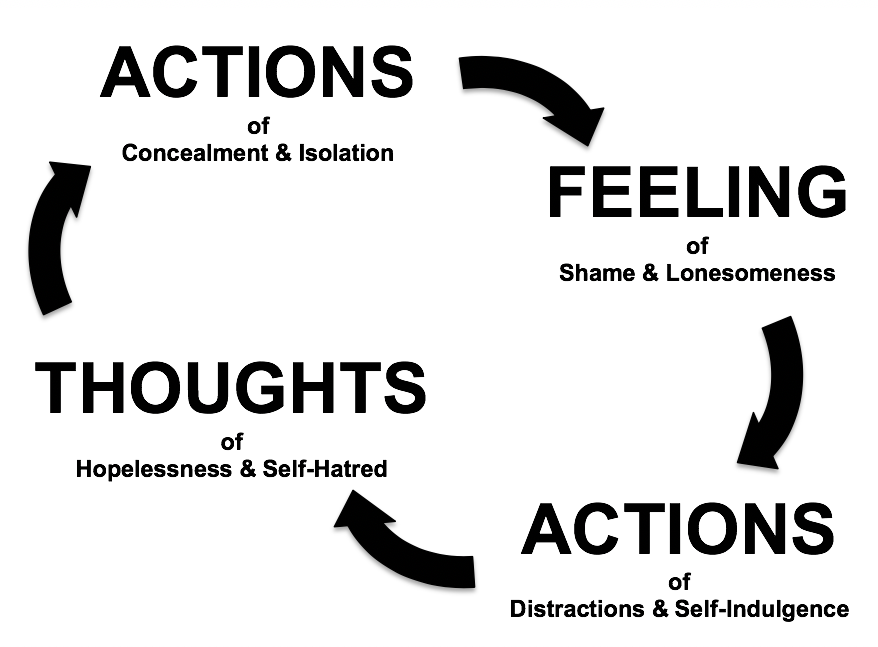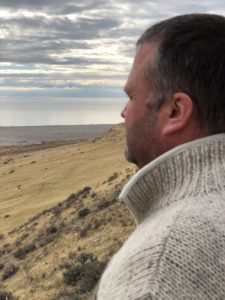Introduction to the Cycle of Reactive Unconsciousness
If you don’t have traction in socks, then put on some shoes.
Why couldn’t the solution to the problem be so simple? If you want to experience love then understand. So why is it so difficult to understand—to understand self or to understand others? Maybe the solution to the problem isn’t as simple as it may seem.
Most of the time I’m overwhelmed at how messed up we have all become and how we have just grown to accept it as a common truth. Everything we see and hear in social media seems to be desensitizing our moral compasses. And the more I gain some small assemblance of self-awareness, I see the excruciating lack of awareness in others. It terrifies me that know we are completely screwed up and embrace it like some kind of wild new fad. Therapy has become a way to satiate our inner knowingness that our behavior is wrong my mentalizing our emotions and walking away from responsibility. There are all the self-help books, workshops, seminars, and metaphysical apparatus and healing techniques that people are cumbering all over each other to get at. I’ll admit . . . I’ve been there. But really? Are these solutions or workarounds moral behavior. It’s a quick fix—what could be called a Band-Aid approach. When one band-aid wears out, we quickly switch it out and put on a new one. When in reality the sore is still there and probably getting infected. Wouldn’t it make sense to do something to heal the sore?
Maybe that’s the real reason why we choose not to put on shoes? We’re scared of facing the real issue and exposing the soreness “understanding”—all that pain deep down within and bringing it to the surface. Taking responsibility for out actions and embracing causality.
Early on in my psychological reboot, I came to define addiction as the outward manifestation of emotional suppression. In a world filled with all kinds of addicts living addictive lives, it has come down to everyone for him or herself; the primary driving force behind day-to-day existence is getting your fix. There are so many types of addictions; they act as noise to cover up the sounds emanating from deep with our souls. The quietude of self-reflection and introspection has been replaced by the tumultuous rat race of modern-day living. Our technocratic advancements only act to speed life’s pace up so we can fill every moment with more and more ways of blocking out the roars of monsters buried in our subconscious minds. We learn to multitask our multitasking becoming ever increasingly adept at suppressing our unacknowledged emotions. And when we have one of those moments of precious freedom from the most pressing matters in our lives, we choose to surf the internet, veg-out in front of the television or engage in too many to list entertainment choices. We’ve even become addicted to therapy using others “advice” and “wisdom” to plug into our own existence. And that might be the reason why you are reading this at this very moment. But here is the truth—each of us must come to a point where we face ourselves in the mirror and embrace the pain within. The pain is the sore and no matter who it is that we listen to or what we try to do to cover it up, it will not heal until we understand and move through it. No one can do it for us. Only we, ourselves are capable of facing the deep truth that festers within and take full responsibility for its existence. With that responsibility comes understanding. And with understanding comes forgiveness for self and others. Only then can Love become a reality.
That is the truth, but I realize that getting there can be quite arduous and daunting. How does one begin? How do I find my shoes? And that is the point of these writings—a map of my own life and experiences for others to use to find their own path to self-understanding. My map will be broad so that many different souls can find a familiar path to relate with to help them on their journey or even just a bump of encouragement. Unfortunately not all will find the answers within my story, but maybe they will find the strength to search out their own path. This map doesn’t have any shortcuts. The route to self-awareness and emotional awaking is different for each person. What my map can illustrate is how we are broken and what cunningness deceived each of us to arrive at our current condition.
Have you ever been in a corn maze? It’s even more of an adventure if someone guides you in blindfolded and the spins you around and around. When the blindfold is removed, all concept of direction is obliterated. But in some corn mazes there is an overlook tower in the center. Concepts I will present can act as an overlook. Ideas that I have learned from ancient wisdom teachings and great philosophers. I will show you through personal experiences how I became lost and the journey I underwent to becoming found. Realizing at that point that this journey has been made by countless others and they have endeavored, such as I, to help others on the journey.
The map I will present will take the form of a cyclic pattern of behavior that I have come to call the “Unconscious Awareness Cycle.” It evolved through years of therapy and self-reflection where I gathered together bits and pieces from small truths that presented themselves from time to time. With each truth, I gleamed a truer picture of what I had become and how I arrived at that point. This was an arduous and grief field process in recognizing the too many negative aspects of my behavior and thinking processes. The first steps into conscious awareness were excruciating as I became aware of how my actions and behaviors were causing such chaos and aguish to so many others. Even the people that I thought I “loved” the most in my life were victims of my self-minded, self-serving, reactive state of unconsciousness.
How do we get to this horrible point where we hurt the people we care about the most? Probably because we don’t feel the real repercussions of our actions. We only see others, as objects in fulfilling some needed aspect of our life. You might say to yourself as you read this that I’m not there. REALLY? And if you are, you are probably not capable of realizing the state in which you currently exist. But this unconscious state of awareness probably began at a very young age and layer upon layer built up as one negative core belief after another found its way into your self-understanding. These beliefs erode at your emotions until gradually we learn to suppress the pain by numbing emotional feelings. Where the emotions gradually cease to function, the mind and its logic fill the void. Let me demonstrate.
I knew at very early age that I was different somehow. I was a dreamer with a wild imagination. I felt things on a profoundly deep level—insomuch that I knew how others felt even before they knew themselves that they felt that way. I saw connections in things and the intricate dynamics of people. For this reason, I was not easily deceived. I experienced early on that people didn’t like to feel. Myself, being a “feeler,” seemed to be all alone in a world of emotionless beings. Others had difficulties relating to me and I learned to escape into a fantasy world where I could surround myself with other feelers and could feel accepted. But at such a young age, my fantasy world bled into my current reality and the boundaries of the two worlds blurred. That led to others thinking I was even more whacked out. And little by little I became more isolate within as well as without.
I was adopted at birth. The knowledge of my adoption was never kept from me. But inside, I wondered why my biological mother gave me away. When I was 6 or 7, my brother had dropped me off at the corner of the property of my school. It was a short walk to the entrance and I had the opportunity that day of following close behind two 6th graders. I listened to their conversation as one of the boys explained that his parents had caught his sister having sex with her boyfriend. At that age, I didn’t have an understanding of sex, but I knew it was something that wasn’t discussed openly in my house. So, I assumed, as with the consequences that this boy’s sister would be facing, that it was something really bad. Then the other boy asked if his sister was pregnant. I knew what it meant to be pregnant. And my mind went to work. My biological mother had sex and became pregnant. I was a result of her doing something that wasn’t right. I was a mistake that she didn’t want to keep. I remember the sounds around me as everything became hollow. My heart seemed to drop into my stomach and my feet filled with lead. I arrived at the steps to the school and sat down. The bell rang and I just sat there—mind reeling. My first-grade teacher saw me sitting outside on the front steps through the classroom window. She came around to get me, but I just sat there unable to speak. The principal soon became involved and he brought me into his office. I couldn’t hear anything that he was saying but I sensed, from some remote place, that he was angry. He took me just outside his door in the hall and gave me three swats with a big wooden paddle. My mother was called and she came into town to get me. It wasn’t until I was in my thirties that I told her what had happened that day. Deep within that young boy, a core belief that I was a mistake had formed. It was a pain that wouldn’t go away, so I learned to ignore it.
This is how it happens. How many times did I voice the questions of my origins and have the response given that my biological mother gave me up for adoption because she loved me so much. She knew that she couldn’t be the mother I needed at such a young age. But the reality of that day came into direct conflict with those affirming statements. I had seen other single mothers keep their child. But every time I approached this issue, I was told what to believe and how to feel. And then my wild imagination led me to become known as a storyteller and liar. That combined with being an exceptionally small and frail child, I was the natural target for bullying and the viciousness of my childhood playmates. One by one, emotional traumas began to build up within without being resolved.
Everyone has experiences. They seem small and insignificant, but their combined weight on our emotional stability breaks even the most resilient. It wasn’t until in my mid-thirties that I finally came to resolve the core belief that I was a mistake not wanted by my biological mother. I actually got to talk to my biological mother and hear her story. Her mother, out of need to protect her family’s name had sent her off to another state to give birth. She wanted to keep me, but her mother deceived her and when she finally got word from my biological father, who was in Vietnam, it was too late and I had been adopted.
Early in my life, a simple cycle began to rotate. I’m not sure how I received this tool or who taught me to cope with the onslaught of emotional distress. But each time the cycle would spin, I would become more captivated by its illusions and deceptions.
Cycles really don’t have a defining beginning or ending, they just turn and turn and turn . . .. until it’s all we come to know; each turn amplifying and tightening the tension on the mechanism.
It begins early in life with our experiences and self-judgements that bring about a kind of self-imposed separation from others—loneliness. Loneliness is a frightening feeling that can easily translate into abandonment, neglect, being undesirable or an outcast. This normal sense of difference can be exacerbated by belief systems or cultural definitions of what is normal. When in reality, each of us is unique and special. But within early development, that concept is distorted by the individuals we have chosen to serve as role models.
Everyone deals with its repercussions differently depending on their temperament and personality coupled with life-experiences. Seriously, no one can make a judgment on another unless they can understand/love them completely.
I don’t want to go into the psychology of everything. Remember, this is only my observations of my own life that I have seen repeated in others.

I knew from a very early age that I was different. For one I was the only member of a family of five that wasn’t biologically born—meaning I was adopted. I had a very creative imagination. My aesthetics senses were more defined and articulated in how I saw the world. My mind was sharp and I saw connections oblivious to others. I was more emotional and sensitive to criticisms and rebukes. I was small (extremely) for my age and fragile. I was bored easily with school and the interaction with my peer group. I preferred to be alone and hated recess. My families religious beliefs also contradicted my own self-definition and isolated me from others. I was different in almost every way and had no one outside that restrictive religious upbringing that I felt safe in describing my perceived reality.
Just for a moment, put yourself in the shoes of a little boy in grade school that had these attributes. Now overlay the cycle. How would you respond?
I was in a world where I didn’t seem to belong. I didn’t feel understood. I lacked the ability to express what was happening to me or how I perceived the world and all its intricate interactions. So, I tried to hide, be unseen, unnoticed in an attempt not to attract unwanted attention or reticule.
I remember we used to play tetherball in gym class in elementary school. A simple volleyball stuck on a rope where you wrap it around a pole by hitting it with your fist. But to me it was a huge demolition ball of horrifying speed bearing down to wreck me. Of course, boys my age found pure delight in completely humiliating me at this game. Such thoughts of hopelessness on how I could escape filled my mind and many days I suddenly became ill and unable to attend school during periods were certain activities would be occurring. I became an expert at evading Physical Education. Now, balancing an egg on a spoon and running swiftly was simplicity with the dexterity I possessed. But not many accolades were distributed for that achievement.
I discovered early that my safe zone was the small farm I lived on. It had a small river, pond and magical forest. I would spend my time alone, caught up in imaginary adventures. I would build forts and establish paths. Build bridges over the river and create secret entrances to hidden places. These times were my distractions to the world that existed in my house and at school.
I soon discovered that I could charm others with stories of adventures of all kinds. My descriptive narratives and creative way of manipulating language could captivate any audience. That was until my 3rd Grade Teacher, Mrs. Oliver, revealed to everyone I was a liar by exposing me fantastical adventures . After that, no one took interest in me other than acts of unkindness.
I was again alone. But now I had shame as a partner in my journey.



